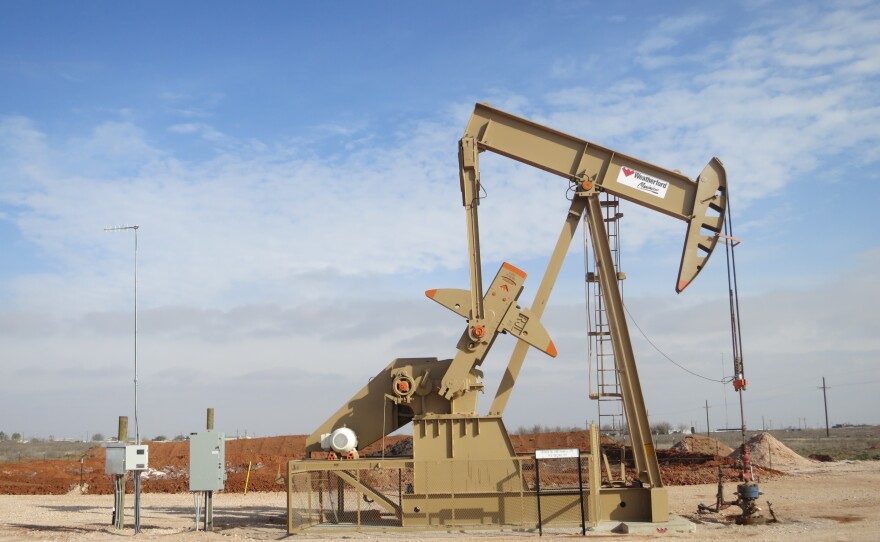MARFA, TX — The oil industry has written the history of the Permian Basin in West Texas and Eastern New Mexico. Eighteen West Texas counties and three in New Mexico are harvesting the rich remains of an ancient sea floor laden with hydrocarbons.
The federal government's Energy Information Administration says production has increased by 93,000 barrels per day year-over-year. Production in the basin has risen to the one million barrels a day point in 2011. It’s projected to reach 1.3 million barrels of oil imminently.
The basin is in hyper-expansion mode. What is extracted in the oil field ripples across the regional economy, according to the Permian Basin Petroleum Association.
Just short of three decades after the last boom and bust, hydraulic fracturing, known as fracking, and horizontal drilling allow extraction of once-inaccessible oil and gas. There are known reserves that are predicted to last several decades.
The Permian's economy, burnished by a history of spectacular ups and downs, is flexing its muscles.
Three oil field workers, Dave Cronwall, Frank McCoy and Darnell Joyson, sum it up succintly.
“Everybody’s here for the money. The reason I came out here was for the money. Make money, the boom, I mean everyone out here is making money!”
The city of Odessa has issued 572 permits for new housing in the last year. Normally that number is 50. Nearby Midland has set a new record for new housing permits this year.
Third-rate motels cost $200 a night and you’re lucky to find a room.
“We’ve got two oil filed supply companies back in there. Union Pacific is about to put a big rail yard out here on 200-and-something acres," said Guy Andrews, Economic Development Director at the Odessa Chamber of Commerce.
His voice trails off, listing projects underway, driving by once-empty flatlands transformed into a nest of construction cranes.
“It’s just gone crazy," Andrews said.
Stopping in front of an oil rig, the 24/7 grinding of the gears is the sound of money.
Some analysts say production will remain viable even if the cost of crude falls to $50 or $60 a barrel. Right now it’s around $98.
Akinrin Made is a petroleum engineer from Nigeria who has been in Odessa for a year. He lives in a spiffed up trailer park, a so-called 'man camp' replete with around-the-clock excellent food and amenities paid for by his employer.
The Niger Delta of Nigeria is a crucible of oil extraction with plenty of work to go around. But Made accepted an invitation to come to Texas.
“A lot of people are relocating here because of the work but the really, really tough thing is housing. You find it difficult to get a living area. And if you can get one it is so expensive,” he said.
Oil field supervisor Charles Moody worked previously in the oilfields of North Dakota and East Texas. In East Texas he had a five bedroom, three bathroom house for $800 a month.
"They’re wanting me to move here and just looking here, you know, there’s one bedroom, one bath homes for $1,800 a month already," Moody said.
Caesar Favela drives an oil truck in Odessa. His face is burnished by the sun and his hands speak volumes about hard work.
He commutes every few months between the Permian Basin and his home fours away near El Paso, Texas.
“You’re not there for Father’s Day. You’re not there for Christmas sometimes. And for the delivery of my kids, you know. Sometimes you gotta miss it. And that’s all part of the work," he said. "I do hate being away from my family. But it’s good money. I got a nice house for them, they dress nice and the whole thing, you know.”
“Le visitara en su casa o en el hospital," screeches a voice on a radio ad. "We will come to you at home or in the hospital."
It’s not that oil fields are less safe. But traffic tells the story here. Arrive at midnight and it feels like rush hour. You see ambulances whipping by all the time. You are 12 times more likely than the national average to be in a traffic accident here.
Catastrophic busts have often followed booms. An oil glut in 1982 pummeled oil prices and the economy here was crushed.
Betsy Donaldson is in the restaurant business.
“It’s nice having a lot of people around. It’s nice having new businesses. But it’s tough because I know it’s not forever. It will go away," she said. "Everybody’s house values will drop. And they’ll still be paying mortgages that are really, really high for houses they can’t sell. This is what’s going to happen. It’s just a matter of time.”
Just how much time is unclear, but the opinions of numerous geologists only vary on the number of decades the oil and gas play in the Permian Basin will last.
Royal Dutch Shell is scouting property. And Haliburton, Apache and Flint Hills Resources owned by Charles and David Koch are just three of the major corporations already here.






